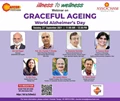
The projected rate of dementia among individuals aged 60 and above in India stands at 7.4%, equating to approximately 8.8 million elderly Indians grappling with this condition. Dementia is more commonly found in women than men and is more prevalent in rural areas as opposed to urban settings.
Beyond the age of 65, the number of individuals living with Alzheimer's disease doubles approximately every five years, emphasizing the significant impact it has on the elderly population. Projections suggest that this already substantial figure will nearly triple, reaching approximately 14 million Americans, by the year 2060. Symptoms of Alzheimer's typically manifest after the age of 60, and the likelihood of developing the condition increases as individuals grow older. This underscores the urgent need for research, care, and support systems to address the growing Alzheimer's epidemic in an aging society.
What is Alzheimer’s Disease?
Alzheimer's disease stands as the predominant form of dementia, characterized by a progressive trajectory that commences with minor memory impairment and can eventually culminate in a profound inability to engage in meaningful conversations or respond to one's surroundings. This condition predominantly affects the regions of the brain responsible for cognition, memory retention, and language comprehension, substantially impairing an individual's capacity to perform routine daily tasks.
What Are The Causes Of Alzheimer’s Disease?
Alzheimer's disease is a complex and multifactorial neurodegenerative disorder, and its exact causes are not fully understood. However, several factors are believed to contribute to the development of Alzheimer's disease, including:
-
Genetics
-
Age
-
Amyloid Plaques
-
Tau Protein Tangles
-
Inflammation
-
Vascular Factors
-
Environmental Factors
-
Lifestyle Factors
-
Hormonal Changes
Warning Signs Of Alzheimer’s Disease
Alzheimer's disease is a progressive neurodegenerative condition that primarily affects memory, thinking, and behavior. While the exact cause of Alzheimer's disease is not fully understood, there are several warning signs and symptoms that may indicate its onset. It's important to note that experiencing one or more of these signs does not necessarily mean a person has Alzheimer's, as some memory lapses can be a normal part of aging.
However, if these signs are persistent or worsening, it's crucial to consult a healthcare professional for a proper evaluation. The warning signs of Alzheimer's disease include:
-
Memory Loss: Forgetfulness is one of the hallmark symptoms of Alzheimer's. People with the condition often forget recently learned information, important dates, and events. They may ask for the same information repeatedly.
-
Difficulty with Problem-Solving and Planning: Individuals with Alzheimer's may have trouble with tasks that involve planning, organizing, and solving problems. This can manifest as difficulty managing finances or following a familiar recipe.
-
Confusion About Time or Place: Alzheimer's may cause individuals to lose track of time, forget where they are, and become disoriented. They might not recognize familiar locations or even forget the current year.
-
Challenges with Familiar Tasks: People with Alzheimer's disease may find it increasingly difficult to complete everyday tasks they used to handle with ease, such as dressing, cooking, or bathing.
-
Misplacing Things: Alzheimer's can cause individuals to misplace items and then have difficulty retracing their steps to find them. They may accuse others of stealing their belongings.
-
Social Withdrawal: Individuals with Alzheimer's may withdraw from social activities and hobbies they used to enjoy due to the challenges they face in these settings.
Treatment of Alzheimer’s Disease
Many experts say that there is no cure for Alzheimer's disease, but there are treatments and interventions that can help manage its symptoms and improve the quality of life for individuals with the condition. It's important to note that research and treatment options may have evolved since that time, so it's always a good idea to consult with a healthcare professional for the most current information. Here are some common approaches to the treatment of Alzheimer's disease:
Medications:
-
Cholinesterase Inhibitors: Drugs like Donepezil (Aricept), Rivastigmine (Exelon), and Galantamine (Razadyne) are often prescribed to help improve memory, thinking, and behavior by increasing levels of acetylcholine, a neurotransmitter that's reduced in Alzheimer's disease.
-
Memantine (Namenda): This medication works differently from cholinesterase inhibitors and can help regulate glutamate, another neurotransmitter involved in learning and memory.
Combination Therapy:
In some cases, both cholinesterase inhibitors and memantine are prescribed together for more comprehensive symptom management.
Symptom Management:
Medications may also be used to manage specific symptoms like depression, anxiety, agitation, and sleep disturbances, which are common in Alzheimer's disease.
Lifestyle and Supportive Measures:
-
Exercise: Regular physical activity may help improve cognitive function and overall well-being.
-
Healthy Diet: A diet rich in fruits, vegetables, and omega-3 fatty acids may support brain health.
-
Social Engagement: Staying socially active can help maintain cognitive function and emotional well-being.
-
Cognitive Stimulation: Activities such as puzzles, games, and reading can help stimulate the brain.
-
Support Groups: Joining support groups can provide emotional support and coping strategies for both individuals with Alzheimer's and their caregivers.
Behavioral Approaches
-
Behavioral Interventions: Techniques such as cognitive-behavioral therapy and reality orientation therapy can help manage challenging behaviours and improve communication with individuals with Alzheimer's disease.
-
Caregiver Training: Caregivers can learn techniques to better handle the behavioural and psychological symptoms of Alzheimer's disease.
Clinical Trials
Participation in clinical trials can provide access to experimental treatments and contribute to the advancement of Alzheimer's research.
Advanced Treatments
Some experimental treatments, such as monoclonal antibodies targeting beta-amyloid plaques, have shown promise in clinical trials, but they may not be widely available or approved at the time of your inquiry.
It's crucial for individuals with Alzheimer's disease and their families to work closely with healthcare professionals to develop a comprehensive treatment plan tailored to their specific needs. Additionally, staying informed about the latest developments in Alzheimer's research and treatment options is important, as new therapies may become available in the future. Always consult with a healthcare provider for the most up-to-date information and guidance on managing Alzheimer's disease.












